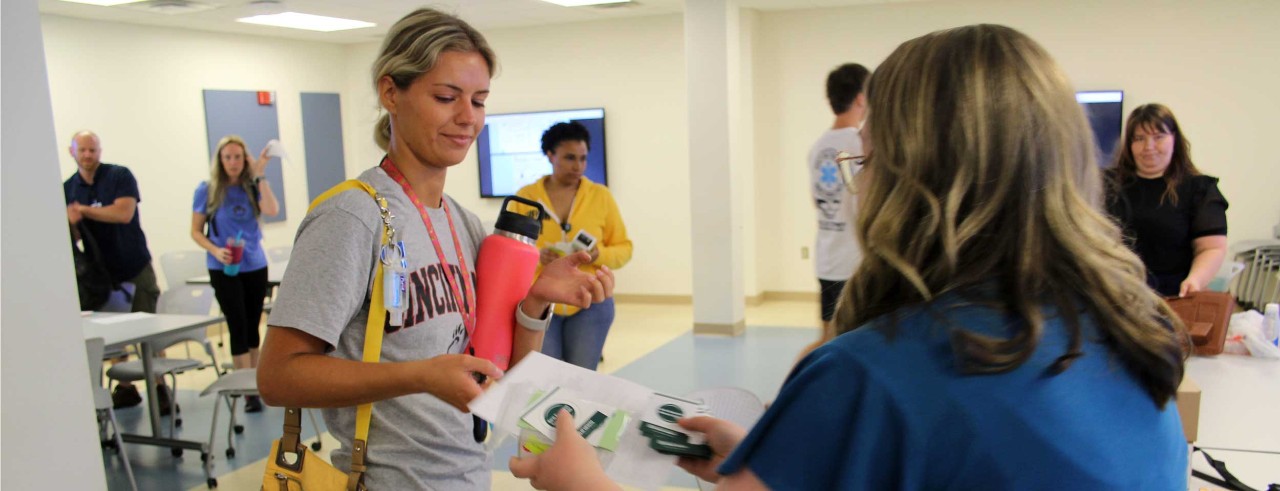
UC nursing students ready to reverse opioid overdose with Narcan
Training provides basics on opioid reversal drug naloxone, distributes Narcan nasal spray
About 50 UC nursing students, faculty and staff are ready to reverse an opioid overdose with Narcan in the hope of saving someone's life.
UC College of Nursing, along with Hamilton County Public Health and Harm Reduction Ohio, provided a training on the signs that a person is experiencing an opioid overdose and how to administer six brands of the opioid overdose reversal drug naloxone, including Narcan. The county’s public health department also provided participants with Narcan nasal spray and fentanyl test strips.
"Overdose deaths continue to rise across the country and in Ohio. We need people to carry naloxone and be prepared to use it in case of an emergency, because anyone can save a life with naloxone," says Tasha Turner-Bicknell, DNP, who co-led the training and serves as director of UC's Public Health Nursing Doctor of Nursing Practice (DNP) and post-bachelor's certificate programs.

Susan Fithen of Hamilton County Public Health distributes Narcan nasal spray and fentanyl test strips to UC nursing students.
Drug overdose deaths skyrocketed across the U.S. in 2021, increasing 30% over the previous year, driven by synthetic opioids like illegally made fentanyl, which are highly potent and hard to detect without a test. Fentanyl has made its way into stimulants like cocaine, crack cocaine, meth and counterfeit Xanax, Oxycodone and Adderall.
That's why, Turner-Bicknell says, even people who use stimulants should know they could experience an opioid overdose. She shared that, in the past decade, drug overdose deaths from the opioid heroine have declined as meth and cocaine deaths have spiked. In Ohio in 2021, only 180 deaths were attributed to heroin, compared to 2,750 from cocaine and meth.
To make matters worse, an animal tranquilizer, xylazine, has been increasingly found in combination with fentanyl and linked to overdose deaths across the nation. Turner-Bicknell discussed xylazine's impacts on an episode of WVXU's Cincinnati Edition.
In response to the increase in drug overdose deaths, the U.S. Food and Drug Administration approved Narcan nasal spray for sale over the counter, meaning people can purchase naloxone without a prescription. Turner-Bicknell says many people who use drugs cannot afford to purchase Narcan, but others around them can now more easily access it.
"You never know who’s using drugs or when someone could overdose in your home or in a restaurant," she says. "I keep one in my car and on my person. I've used mine in a bar."
Ben Greenwell, a fourth-year UC Bachelor of Science in Nursing (BSN) student who attended the training, says he experienced a time during his co-op at Cincinnati Children's when Narcan was administered.
"Obviously, you don’t want to have to use it at any point, but if a situation arises, it's a great thing to know how to use," he says.
AmandaLynn Reese, director of Programming for Harm Reduction Ohio, who led the second half of the training, emphasized naloxone's safety. The medication, which works by blocking opioid receptors in the brain, does not cause any significant side effects. An opioid-dependent person, however, may experience withdrawal symptoms after receiving naloxone. That's when it is important to treat people who use drugs with compassion and respect, Reese says.
"Your interaction with this person can validate or negate relationships that other health professionals have been building."
In fact, harm reduction is all about building relationships with people who use drugs. Within this framework, public health nurses and other professionals work directly with drug-dependent individuals, providing them with health care access and resources that empower them to take control of their health.
Turner-Bicknell, a Harm Reduction Ohio board member, says, "The reality is that people use drugs — not just a little, but a lot. My goal is to meet them where they are, just as they are, and offer them the services they need today."
UC College of Nursing plans to offer another naloxone training during the fall semester.
More Information
Learn more about UC's public health nursing programs:
Related Stories
New UC program focuses on caring for the underserved
January 20, 2021
The UC College of Nursing and James L. Winkle College of Pharmacy are collaborating on a graduate certificate to train students to care for the underserved. There is a growing need in the community for health care workers with these skills.
New climate change health research center under development at UC
October 15, 2024
The National Institute of Environmental Health Sciences of the National Institutes of Health has awarded a grant to the University of Cincinnati to establish the Cincinnati Center for Climate and Health.
First-generation students find a home at UC
November 7, 2024
The University of Cincinnati celebrates first-gen students, the Bearcats who are the first in their families to attend college. They bring new perspectives to student life and account for about 1 of every 5 students on campus. Nov. 8 is First Generation College Student Day, celebrated across the nation.
